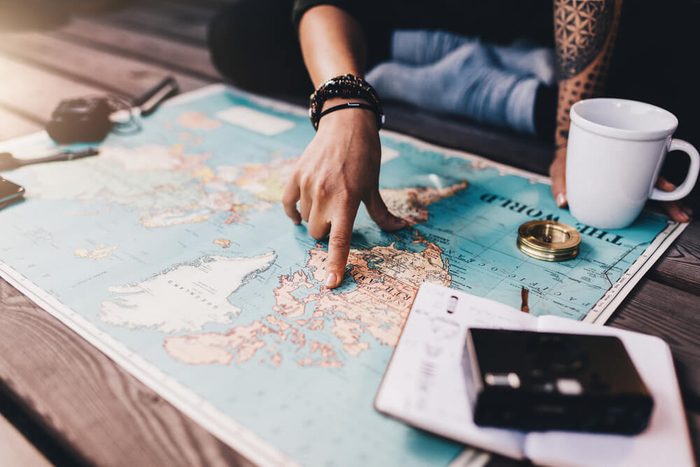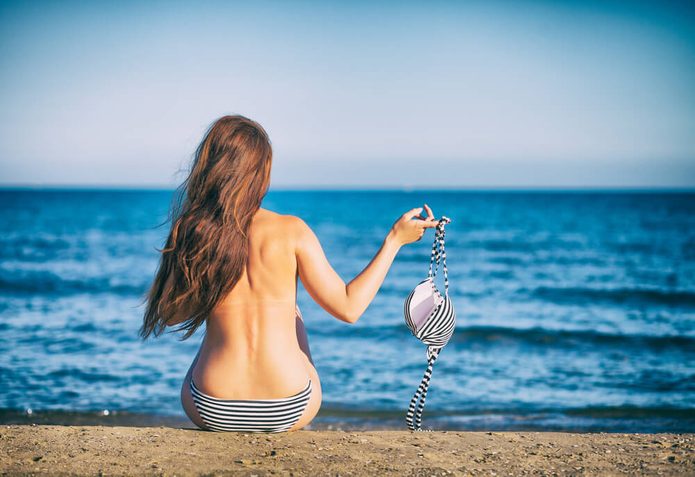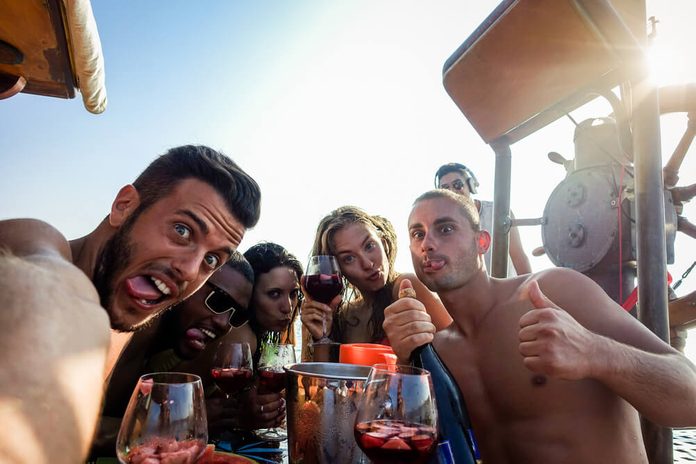There are places where you can't snack ... or wear high heels?! Learn these funny international laws before your next trip.

24 Funny International Laws You’d Never Know Were Real


Don’t eat on church steps in Italy
Be careful where you consume a relaxing lunch or a refreshing beverage in Italy. Specifically in Florence, both tourists and locals are banned “from pausing in the historic center to eat food on sidewalks, roadways and on the doorsteps of shops and houses,” according to CNN. Those who fail to comply risk being fined upwards of $580—or being sprayed with water, another method the city has enacted to deter people from snacking on church steps.

Leave your Vicks inhaler at home if traveling to Japan
“While numerous medications are easily available in Western countries without a prescription, Japan takes a much harder line on certain ingredients,” states Japan Travel. Over-the-counter allergy/sinus medications that contain “narcotic or stimulant ingredients in excess of the Japanese standard”—such as pseudoephedrine, which is found in Vicks inhalers and Sudafed—are banned under Japan’s strict anti-stimulant drug laws. Medications that feature codeine are also prohibited under Japanese law.

Don’t eat on church steps in Italy
Be careful where you consume a relaxing lunch or a refreshing beverage in Italy. Specifically in Florence, both tourists and locals are banned “from pausing in the historic center to eat food on sidewalks, roadways and on the doorsteps of shops and houses,” according to CNN. If you don’t comply, you risk being fined upwards of $580—or being sprayed with water, another method the city uses to deter people from snacking on church steps.

Keep your top on in Fiji
Fiji is a beautiful tropical paradise where sunbathing and swimming are part of daily life, but don’t get caught with your pants (or top) down. “Topless bathing and nudity in public is illegal. Cover your shoulders and knees in rural villages,” warns the UK government, adding that the country’s ritual kava ceremonies are also times when tourists should be buttoned up.

Avoid feeding the pigeons in San Francisco
It’s illegal to feed pigeons on the streets of San Francisco. The city famous for the Golden Gate Bridge notes the ubiquitous birds “dirty public spaces, do costly damage to buildings and can spread life-threatening diseases, especially to the elderly and immune-deficient,” according to San Francisco Public Works. If you’re caught providing food to San Francisco’s pigeons, you could face a hefty fine. Citizens are even encouraged to report pigeon feeders to the city’s police department.

Leave your Bible at home before visiting the Maldives
In the Maldives, public observance of any religion other than Islam is prohibited, and it’s an offense to import Bibles or religious statues into the country. The U.S. Department of State warns that “penalties for contravention of the law range from imprisonment for three months to three years.” To ensure that you don’t upset the locals or run afoul of the law, don’t bring a Bible along on your trip.

Hold the selfies in Kazakhstan
Want to capture one last snapshot of your family in the airport before you board the plane? In Kazakhstan, it’s against the law. The UK Government states that “you could start problems with local officials if you take photos or videos of or near military sites, border areas, airports and some official buildings,” adding that there “may not be any signs warning about these restrictions,” so travelers should be extra vigilant and avoid snapping pics in these places at all cost.

Don’t smoke in Jamaica, mon
Tourists may be surprised to discover that marijuana is outlawed in Jamaica. Since 1913, Jamaican law has stated that the cultivation, use or possession of marijuana is illegal. People caught with even a small amount of the plant can face a lengthy prison sentence—even on 4/20.

Pucker up at your peril in the United Arab Emirates
Public displays of affection—kissing, hugging, holding hands—should be avoided while traveling in the United Arab Emirates. Tourists have been arrested and thrown in jail for kissing in public. Reserve all amorous moments for private occasions behind closed doors.

Keep your pants on in Greece
The Greeks and indecent behavior don’t mix. If you’re the type of person who gets a laugh out of mooning other folks, you might want to keep your pants up and your belt buckled. Dropping your drawers is a chargeable offense in Greece that can bring with it a steep fine or jail time.

Don’t wear bathing suits beyond the beach in Barcelona
Don’t wander away from the Barcelona seafront dressed in just your bikini or swim trunks. In this Spanish city, it’s “illegal to be in the street wearing only a bikini or swimming shorts,” reports Wales Online. “Being bare-chested is also illegal in some areas in Spain,” adds Gov.uk. “You could be fined if you’re caught wearing swimwear on the seafront promenade or adjacent streets.” Cover up or change out of your bathing suit if you plan to leave the beach or promenade—failing to do so will result in a financial dent in your wallet amounting to roughly $675.

Butt out and chew carefully in Singapore
Smoking laws are more severe in Singapore than they are in the United States. Lighting up in public—in restaurants, on the street, in a park—will earn a stiff fine in this Asian country. Gum chewers aren’t exempt from tough regulations either. It’s illegal to chomp gum while riding on Singapore’s Mass Rapid Transit (MRT) system, and like smoking, this offense “carries a hefty fine and possible jail term for those caught importing, selling or manufacturing chewing gum,” according to Singapore’s National Library Board.

Don’t empty your piggy bank for purchases in Canada
If you’re shopping in Canada, don’t expect cashiers to accept stacks of coins as your sole method of payment. According to Canada’s Currency Act, stores can legally refuse excessive amounts of coins. With pennies, for example, customers’ payments may be rejected if they try to use more than 25 one-cent coins at one time.

Follow baby-naming guidelines in Denmark
Parents-to-be can only get so creative with their baby name brainstorming. Under Denmark’s Law on Personal Names, their final choice must come from a pre-approved list of 7,000 names. If they want to go with something more unique, parents must get government approval.

Put down your water guns in Cambodia
Some funny international laws even target toys. Apparently, residents of Phnom Penh (the capital of Cambodia) sometimes go bonkers with their water guns. In 2001, Governor Chea Sophara banned the sale and import of all water guns to cut down on accidents and incidents of people maliciously using the toys. He worried their use could cause social unrest and disrupt security during the Khmer New Year.

Bike responsibly in Mexico
You’ve heard of reckless driving, but in Mexico, they’re also concerned about reckless biking. Anyone riding a bike may not lift their feet from the pedals because they could potentially lose control. It may sound a little extreme, but lawmakers are really just looking out for bikers’ safety.

Don’t get people wasted in Australia
Bars and taverns all over the world have one primary purpose: to serve alcohol. However, any Australians with a liquor license are prohibited from engaging in “practices or promotions that encourage rapid or excessive consumption of liquor,” the law states. Getting patrons too drunk down under could result in a $12,904 fine.

Keep it down in Canada
The city of Petrolia in Ontario could be easily mistaken for Bomont, the fictional town from the movie Footloose. Dancing isn’t banned, but excessive noise is, which means no singing, whistling and yelling between 11 p.m. and 7 a.m.

Swap out your high heels in Greece
Well, the historic parts of Greece. Officials prohibit anyone from wearing high heels at certain ancient locations because they could actually damage the site. NPR reported that food and drink are also banned after maintenance workers found nearly 60 pounds of gum under the seats of a theater built in 161 A.D. We can live without heels and candy, of course—but unfortunately, some far more fundamental human rights aren’t universal around the world.

Be respectful of money in Thailand
We’re not talking about spending it wisely. Stepping on Thai money, called Baht, is illegal because it has the likeness of the Thai royal family on it. Defacing any image of the royal family has been against the law since 1908, and it could land you in jail.

Visit your parents if you live in China
In 2013, China passed the Elderly Rights Law, which states that adults are required to visit their aging parents “often.” No word on exactly what “often” means, but if people fail to comply, the court could force them to visit their parents a certain number of times each month.

Don’t bring Polish potatoes into Britain
In 2004, British officials banned the importation of potatoes that came from Poland. But it’s not because the Brits have anything against the Polish. The law was put in place because there was an outbreak of ring rot (a disease that can ruin potato crops) on Polish potatoes. According to The Independent, the law is “still in force and you have to follow that procedure.”

Keep your eyes on your own paper in Bangladesh
Everyone should know that cheating on a test is wrong. Many schools around the world, especially universities, threaten expulsion if students are caught cheating on exams, but in Bangladesh, the stakes are even higher. “Whoever cheats shall be punished with imprisonment of either description for a term which may extend to one year, or with fine, or with both,” their government warns.

Listen to Canadian musicians in Canada
Bring on the Celine Dion, Michael Bublé and Justin Bieber tunes. The Canadian Radio-television and Telecommunications Commission states that all English- and French-speaking radio stations that play “popular music” (think American Top 40 hits) must make sure that at least 35% of that content is from Canadian artists.

Don’t swear in the Caribbean
Keep that sailor talk in the United States! Saint Kitts, also known as Saint Christopher Island, has a strict law against using profanity in public, and failure to comply could get you arrested. That’s what happened to rapper 50 Cent when he let a curse word slip at a concert in 2016. Those cops don’t mess around.
Why trust us
Reader’s Digest has published hundreds of travel stories that help readers explore the world safely, easily and affordably. We regularly cover topics such as the best places to visit (and the best times to visit them), tips and tricks to zoom through airport security, flight-attendant secrets, hotel-room hacks and more. We’re committed to producing high-quality content by writers with expertise and experience in their field in consultation with relevant, qualified experts. We rely on reputable primary sources, including government and professional organizations and academic institutions as well as our writers’ personal experiences where appropriate. For this piece, Claire Nowak relied on her experience as a seasoned journalist to investigate funny international laws and customs. We verify all facts and data, back them with credible sourcing and revisit them over time to ensure they remain accurate and up to date. Read more about our team, our contributors and our editorial policies.
Sources:
- U.S. Embassy and Consulates in Japan: “Bringing Over-the-Counter Medicine and Prescriptions into Japan”
- Condé Nast Traveler: “Florence Is Spraying Water on Cathedral Steps to Shoo Away Snacking Tourists”
- U.S. Department of State: “2022 Report on International Religious Freedom: Maldives”
- Gov.uk: “Foreign travel advice: United Arab Emirates: Safety and security”
- National Library Board: “Chewing gum is banned”
- The New York Times: “Jens and Vita, but Molli? Danes Favor Common Names”
- Canadian Radio-television and Telecommunications Commission: “Canadian content requirements for music on Canadian radio”
- The Independent: “The UK’s strangest laws that are still enforced”
- BBC: “New China law says children ‘must visit parents'”
- World Nomads: “Laws in Thailand: How Travelers Can Stay Out of Jail”
- NPR: “Heels, Food Banned From Ancient Greek Sites”



















